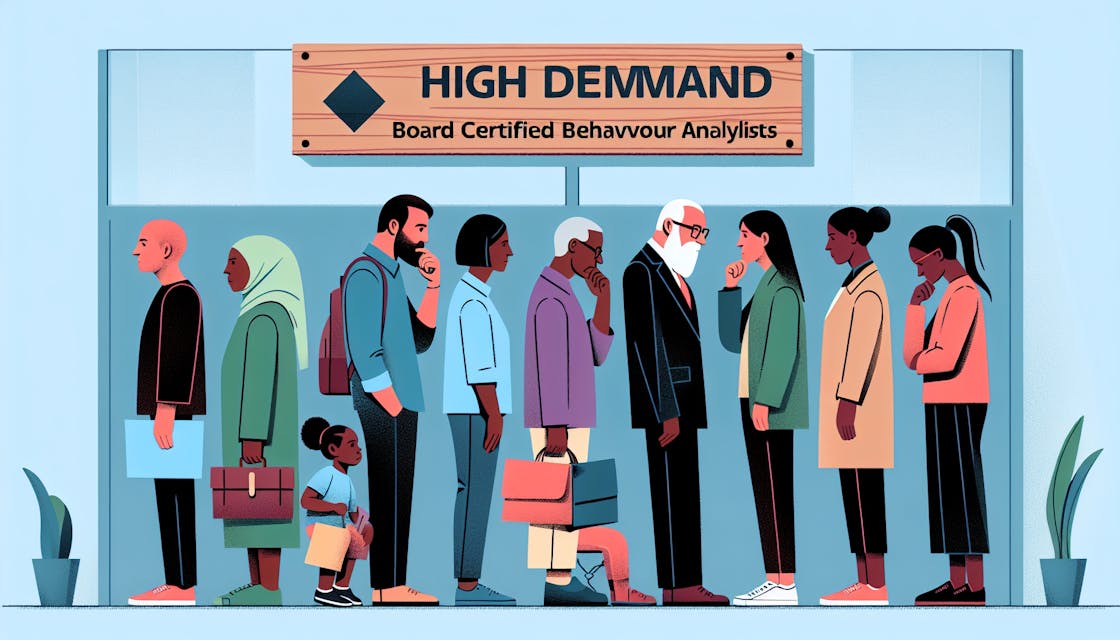The Growing Demand for BCBAs
As the field of Applied Behavior Analysis (ABA) continues to gain recognition and importance in various settings, there has been a significant increase in the demand for Board Certified Behavior Analysts (BCBAs). The growing demand for BCBAs can be attributed to several factors, including projected job growth, an increasing number of BCBAs, and the diverse settings and fields requiring their expertise.

Projected Job Growth for BCBAs
The job growth rate for BCBAs is projected to be 8 percent from 2020 to 2030, which is much faster than the average for all psychologists. This growth indicates a strong need for BCBAs in the coming years, reflecting the increasing demand for their specialized skills and knowledge in the field of ABA.
Increasing Number of BCBAs
The number of BCBAs has been steadily increasing over the years, further highlighting the growing demand for their expertise. Between July 1, 2018, and July 1, 2021, the number of BCBAs in the U.S. increased by 65%, reaching a total of 45,103. This significant rise in the number of BCBAs signifies the expanding recognition of ABA as an effective approach in addressing various behavioral challenges.
Settings and Fields Requiring BCBAs
BCBAs are in demand across various settings, including schools, clinics, hospitals, and homes. Their expertise is sought after in educational institutions to support students with autism spectrum disorder (ASD) and other behavioral needs. They also play a vital role in clinical settings, working alongside healthcare professionals to develop and implement behavior-based interventions. Moreover, their skills are valuable in providing in-home services, supporting families and individuals in navigating behavioral challenges and promoting positive outcomes.
To visualize the distribution of BCBAs across the U.S., it is worth noting that in July 2018, more than half of all counties (54%) had no BCBAs. However, by July 2021, this number had declined to a little less than half of all counties (46%) with no BCBAs. This indicates a gradual increase in the availability of BCBAs in various regions, although there are still areas where the demand for BCBAs remains high.
The growing demand for BCBAs is driven by the valuable contributions they make in improving the lives of individuals with behavioral challenges. As the field of ABA continues to expand and gain recognition, the need for BCBAs is expected to persist, creating ample opportunities for individuals pursuing a career in this field.
The Role of BCBAs
Board Certified Behavior Analysts (BCBAs) play a crucial role in supporting individuals with autism spectrum disorder (ASD) and other developmental disabilities. They are responsible for collecting and analyzing data to evaluate the effectiveness of interventions and make data-driven decisions regarding treatment adjustments. Let’s explore the specific roles BCBAs play in the field.
Data Collection and Analysis
One of the primary responsibilities of BCBAs is to collect and analyze data related to the behavior of individuals receiving therapy. By systematically gathering data, BCBAs can assess the effectiveness of interventions and track progress over time. This data collection process typically involves the use of standardized assessment tools, direct observation, and interviews with clients and caregivers.
Using their expertise in behavior analysis, BCBAs interpret the collected data to identify patterns, trends, and areas of improvement. This analysis allows them to make informed decisions regarding treatment adjustments. For example, if certain interventions are not producing the desired outcomes, BCBAs can modify the treatment plan accordingly to ensure the best possible results for their clients.
Treatment Adjustments and Decision-Making
Based on the data collected and analyzed, BCBAs make informed decisions regarding treatment adjustments. They collaborate with the individual receiving therapy, their family, and other professionals involved to develop behavior intervention plans tailored to the individual’s needs and goals. These plans outline specific strategies and techniques to address problem behaviors and promote positive behaviors.
BCBAs continuously monitor the progress of individuals in therapy and adjust the treatment plan as needed. This may involve modifying intervention strategies, introducing new techniques, or refining existing approaches. The goal is to maximize the effectiveness of the therapy and support provided, ensuring the best possible outcomes for individuals with ASD and other developmental disabilities.
By leveraging their expertise in data analysis and treatment adjustments, BCBAs play a vital role in improving the quality of life for individuals with special needs. Their ability to make evidence-based decisions and implement targeted interventions contributes to the success of therapy and support programs.
The roles of BCBAs extend beyond data collection and treatment adjustments. They also contribute to the development and oversight of behavior intervention plans, provide training and support to caregivers and other professionals, and promote the use of evidence-based practices in the field of applied behavior analysis. Through their dedication and expertise, BCBAs positively impact the lives of individuals with ASD and other developmental disabilities.
Employment Outlook and Opportunities for BCBAs
As the demand for Applied Behavior Analysis (ABA) services continues to rise, so does the need for qualified Board Certified Behavior Analysts (BCBAs). BCBAs play a crucial role in supporting individuals with Autism Spectrum Disorder (ASD) and other developmental disabilities, and their expertise is sought after across various settings, including schools, clinics, hospitals, and private practices.
Favorable Employment Outlook
The employment outlook for BCBAs is highly favorable, with a projected job growth rate of 8 percent from 2020 to 2030. This growth rate is much faster than the average for all psychologists, indicating a strong demand for BCBAs in the coming years. The job growth outlook for BCBAs surpasses that of related positions in the field, such as family and marriage therapists and behavioral counselors.
The demand for BCBAs has been steadily increasing, with a significant growth rate observed from 2010 to 2018. In fact, the demand for BCBAs increased by 1,942% during this period, and by 127% between 2017 and 2018. Similarly, the demand for assistant behavior analysts (BCaBAs) rose by 1,098% from 2010 to 2018, and by 184% from 2017 to 2018.
Urban and Rural Opportunities
The opportunities for BCBAs extend beyond urban areas, as job openings can be found in both urban and rural settings. All 50 states in the U.S. have experienced an increased demand for BCBAs in recent years, making it an opportune time to pursue a career in this field. ABA therapy companies across the country actively seek certified behavior therapists to join their teams.
By considering employment opportunities in both urban and rural areas, aspiring BCBAs have a broader range of options when it comes to finding positions that align with their professional goals and personal preferences. This flexibility in job location allows BCBAs to make meaningful contributions to individuals with ASD and other developmental disabilities, regardless of the community they serve.
As the demand for BCBAs continues to grow, it is essential for aspiring professionals in this field to stay up-to-date with the latest research, techniques, and interventions. Ongoing professional development and a commitment to advancing one’s skills are key factors in not only securing employment opportunities but also providing high-quality services to individuals and their families.
In summary, the employment outlook for BCBAs is highly favorable, with a projected job growth rate above the national average. Whether in urban or rural areas, BCBAs have numerous opportunities to make a positive impact on the lives of individuals with ASD and other developmental disabilities. By staying informed and continuously developing their expertise, BCBAs can thrive in this rapidly growing field.
Factors Contributing to the Demand for BCBAs
The demand for Board Certified Behavior Analysts (BCBAs) has been on the rise, driven by various factors that highlight the importance of their role in providing therapy and support for individuals with Autism Spectrum Disorder (ASD). The following factors contribute to the increasing demand for BCBAs:
Increased Awareness and Understanding of ASD
One significant factor driving the demand for BCBAs is the increased awareness and understanding of Autism Spectrum Disorder (ASD). As knowledge about ASD spreads, more individuals and families are seeking appropriate interventions and therapies to support individuals with ASD. BCBAs play a crucial role in designing and implementing effective behavior analysis programs tailored to the unique needs of individuals with ASD. This increased awareness has led to a growing demand for qualified BCBAs to provide specialized services and support.
Expanded Applications of ABA
The expanding applications of Applied Behavior Analysis (ABA) have also contributed to the demand for BCBAs. ABA is an evidence-based approach that focuses on understanding and modifying behavior to improve individuals’ quality of life. While ABA has long been recognized as an effective intervention for individuals with ASD, its applications have expanded to address various other behavioral challenges and developmental disorders. BCBAs, with their expertise in ABA techniques and strategies, are sought after to provide services across a broader range of populations and settings.
Legal and Insurance Mandates
Another factor driving the demand for BCBAs is the presence of legal and insurance mandates. Many states and insurance providers now require coverage and reimbursement for ABA services for individuals with ASD. These mandates ensure that individuals with ASD have access to necessary interventions, including ABA therapy provided by BCBAs. As a result, the demand for BCBAs has increased significantly to meet the requirements set forth by these mandates.
These factors collectively contribute to the growing demand for BCBAs, highlighting the importance of their skills and expertise in addressing the needs of individuals with ASD and other developmental disorders. As the prevalence of ASD continues to rise globally, the demand for qualified BCBAs is expected to persist and increase further. It is crucial to retain and support BCBAs in the field to ensure that the growing needs of individuals with ASD are met effectively.
Retaining BCBAs in the Field
While the demand for Board Certified Behavior Analysts (BCBAs) continues to grow, it is essential to address the challenges that can contribute to BCBAs leaving the field. Retaining experienced BCBAs is crucial for ensuring the continued provision of high-quality therapy services for individuals with Autism Spectrum Disorder (ASD). Some of the challenges faced by BCBAs include burnout, low pay, limited professional development opportunities, and a lack of career advancement options.
Addressing Challenges
To retain BCBAs in the field, it is important to address the challenges they face. This includes implementing strategies to prevent burnout and promote work-life balance. Providing adequate support, recognition, and rewards for their contributions can help BCBAs feel valued and motivated to stay in the field. Additionally, offering competitive and fair compensation packages is crucial to attract and retain talented professionals.
Creating a supportive and collaborative work environment is also essential. Encouraging open communication, providing mentorship opportunities, and fostering professional relationships can contribute to the overall job satisfaction of BCBAs. Furthermore, organizations should prioritize the well-being of their BCBAs by offering mental health support and resources to help cope with the demands of the job.
Professional Development and Advancement
BCBAs often have opportunities for professional growth and increased earnings through continuing education, gaining additional certifications, and expanding their skill set in areas that are in demand. Professional development opportunities can include attending conferences, workshops, and seminars to stay updated with the latest research and advancements in the field. By investing in their professional growth, BCBAs can enhance their expertise and contribute to the overall quality of therapy services.
Joining professional organizations in the field of behavior analysis, such as the Association for Behavior Analysis International (ABAI) and the Behavior Analyst Certification Board (BACB), can provide BCBAs with access to valuable resources, networking opportunities, and professional development events. These organizations offer a platform for collaboration, knowledge sharing, and support within the field.
By addressing the challenges faced by BCBAs and providing opportunities for professional development and advancement, organizations can foster a positive work environment that promotes retention. Investing in the well-being and career growth of BCBAs not only benefits the individuals themselves but also ensures the availability of highly skilled professionals to meet the growing demand for ABA therapy services.
Remember, retaining BCBAs is a collective effort that requires collaboration between employers, professional organizations, and the entire ABA community. By working together, we can create a supportive and rewarding environment that encourages BCBAs to stay in the field and make a positive impact on the lives of individuals with ASD.
Joining Professional Organizations
To stay connected with the field of behavior analysis and enhance professional growth, joining professional organizations is highly recommended for BCBAs. These organizations provide valuable resources, networking opportunities, and professional development events that can contribute to career advancement. Two prominent organizations in the field are the Association for Behavior Analysis International (ABAI) and the Behavior Analyst Certification Board (BACB).
Resources and Networking Opportunities
Joining professional organizations like ABAI and BACB offers BCBAs access to a wealth of resources. These resources may include research articles, publications, and industry-specific information pertaining to behavior analysis. By staying up-to-date with the latest research and developments, BCBAs can continually expand their knowledge and skills.
In addition to resources, professional organizations provide networking opportunities. BCBAs can connect with colleagues, share experiences, and exchange ideas through online forums, conferences, and local chapters. Networking within the field allows BCBAs to build professional relationships, collaborate on projects, and stay informed about job opportunities.
Professional Development Events
Professional organizations host a variety of professional development events that are beneficial for BCBAs. These events may include conferences, workshops, seminars, and webinars. Attending such events enables BCBAs to broaden their understanding of current trends, research findings, and best practices in behavior analysis.
Professional development events also offer opportunities for BCBAs to earn continuing education units (CEUs) or continuing professional development (CPD) credits. These credits are often necessary for maintaining certification and demonstrate a commitment to ongoing learning and professional growth.
By participating in professional development events, BCBAs can expand their skill set, gain insight from industry experts, and stay at the forefront of their profession.
Joining professional organizations in the field of behavior analysis, such as ABAI and BACB, provides BCBAs with a multitude of benefits. Access to valuable resources, networking opportunities, and professional development events can greatly contribute to the success and advancement of BCBAs in their careers.
The Shortage of BCBAs
As the demand for Board Certified Behavior Analysts (BCBAs) continues to rise, a shortage of qualified professionals in the field has become evident. This shortage poses challenges in meeting the growing need for Applied Behavior Analysis (ABA) services for individuals with Autism Spectrum Disorder (ASD). Efforts are being made to address this shortage through various initiatives aimed at increasing the number of BCBAs and expanding access to ABA services.
Factors Contributing to the Shortage
Several factors contribute to the shortage of BCBAs in the workforce:
- Increased Demand: The demand for BCBAs has outpaced the number of professionals available in the field. The growing awareness and understanding of ASD have led to an increased demand for ABA services, resulting in a higher need for BCBAs to provide these specialized interventions.
- Challenges in Retention: BCBAs face various challenges within the field that contribute to professionals leaving. Factors such as burnout, low pay, limited professional development opportunities, and a lack of career advancement options can impact job satisfaction and retention. Addressing these challenges is crucial to retaining BCBAs and ensuring continued access to quality therapy services for individuals with ASD.
- Limited Training Programs: The availability of accredited training programs for individuals pursuing certification as BCBAs is limited. The time and resources required to obtain certification can be a barrier for potential professionals looking to enter the field.
Efforts to Address the Shortage
To address the shortage of BCBAs, various initiatives and strategies are being implemented:
- Increased Training Programs: Efforts are being made to expand the availability of accredited training programs for individuals seeking certification as BCBAs. These programs aim to provide comprehensive training and education to meet the growing demand for qualified professionals.
- Support for Professional Development: Providing ongoing professional development opportunities is crucial for retaining BCBAs in the field. Continued education, training workshops, and mentorship programs can help BCBAs enhance their skills, stay updated with the latest research and best practices, and increase job satisfaction.
- Expansion of ABA Services: Initiatives are underway to increase the availability of ABA services for individuals with ASD. This includes advocating for insurance coverage and reimbursement for ABA therapy, expanding access to services in underserved areas, and promoting the integration of ABA principles in various settings, such as schools and healthcare facilities.
By addressing the factors contributing to the shortage and implementing strategies to attract and retain BCBAs, it is possible to meet the growing demand for ABA services and provide individuals with ASD the support they need. Continued efforts in training, professional development, and expanding access to ABA services are essential to ensure the availability of qualified BCBAs and improve outcomes for individuals with ASD.
Job Growth Trends for BCBAs
As the demand for applied behavior analysis (ABA) therapy continues to rise, so does the need for Board Certified Behavior Analysts (BCBAs). The job growth trends for BCBAs reflect the increasing demand for their specialized skills and expertise.
Increasing Demand for BCBAs
The job growth rate for BCBAs is projected to be 8 percent from 2020 to 2030, which is much faster than the average for all psychologists. This growth rate indicates a strong demand for BCBAs in the field. The number of BCBAs has been steadily increasing over the years, further highlighting the growing demand for their services.
Between July 1, 2018, and July 1, 2021, the number of BCBAs in the U.S. increased by 65%, from 27,320 to 45,103. This substantial increase in the number of BCBAs reflects the expanding need for their expertise in providing ABA therapy to individuals with autism spectrum disorder (ASD) and other behavioral challenges.
Regional Disparities in BCBA Distribution
While the number of BCBAs has been growing, there are still regional disparities in their distribution. In July 2018, more than half of all counties in the U.S. (54%) had no BCBAs. However, by July 2021, this number decreased to a little less than half of all counties (46%) with no BCBAs. This indicates progress in expanding the reach of BCBAs across different regions, but there is still work to be done to ensure access to their services nationwide.
The distribution of BCBAs is influenced by various factors, including population density, availability of resources, and awareness of ABA therapy. Urban areas tend to have a higher concentration of BCBAs compared to rural areas, where access to these professionals may be more limited. Efforts are being made to address these disparities and ensure that individuals in all regions have access to the services provided by BCBAs.
The increasing demand for BCBAs and the regional disparities in their distribution highlight the importance of expanding the workforce and improving access to ABA therapy across different areas. As the field of ABA continues to grow and evolve, it is essential to address these trends and ensure that individuals with behavioral challenges, including those with ASD, have access to the support and intervention they need.
The Demand for BCBAs in the ABA Therapy Market
The demand for Board Certified Behavior Analysts (BCBAs) in the Applied Behavior Analysis (ABA) therapy market is driven by various factors. This section will explore the key factors contributing to the demand for BCBAs in the ABA therapy market: the growing Autism Spectrum Disorder (ASD) population, insurance coverage and access to ABA therapy, and the market’s fragmentation and stability.
Growing ASD Population
One of the primary drivers of the demand for BCBAs in the ABA therapy market is the growing ASD population. Over the past two decades, the prevalence of ASD has steadily increased. The number of children diagnosed with ASD has risen from 1 in 150 in 2000 to 1 in 44 as of 2022. This increase in ASD prevalence has created a significant demand for ABA therapy services to support individuals with ASD in their development and daily lives.
Insurance Coverage and Access to ABA Therapy
Another factor contributing to the demand for BCBAs in the ABA therapy market is the increasing insurance coverage and access to ABA therapy. In recent years, there has been a significant expansion in insurance requirements for ASD coverage. Currently, all 50 states in the U.S. mandate insurance coverage for ASD in state-sponsored plans, compared to 38 states in 2014. This expansion in insurance coverage has led to improved access to ABA therapy for individuals with ASD, further driving the demand for BCBAs.
Market Fragmentation and Stability
The ABA therapy market is characterized by its fragmentation, with a large number of players operating within the industry. The market is highly distributed among smaller players, with the top nine companies accounting for only 27% of revenue. This fragmentation indicates the presence of numerous opportunities for BCBAs to work in various settings and organizations within the ABA therapy market.
Furthermore, the ABA therapy industry enjoys relative stability compared to traditional healthcare sectors. It faces fewer regulatory challenges, which contributes to its overall growth and development. This stability attracts professionals, including BCBAs, to pursue careers in the ABA therapy field.
By understanding the factors driving the demand for BCBAs in the ABA therapy market, it becomes evident that the increasing ASD population, insurance coverage expansion, and market stability play significant roles. As the demand for ABA therapy services continues to rise, the need for qualified BCBAs to provide effective and evidence-based interventions for individuals with ASD becomes increasingly critical.
The Global Demand for BCBAs
As the field of behavior analysis continues to grow, the demand for Board Certified Behavior Analysts (BCBAs) is increasing not only within the United States but also globally. This section explores the demand for BCBAs in the United States and Canada.
Demand in the U.S.
The demand for BCBAs in the United States has been steadily rising over the years. In 2018, there were approximately 10,864 BCBAs in the country. However, this number is projected to increase to 14,018 by 2024, indicating a 29% growth in demand. This expansion in demand can be attributed to several factors, including increased awareness about the benefits of behavioral interventions, greater funding for services, and expanding employment opportunities in various sectors such as healthcare, education, and social services.
Demand in Canada
Similar to the United States, the demand for BCBAs in Canada has also been on the rise. In 2018, there were approximately 1,027 BCBAs in the country. By 2024, this number is projected to increase to 1,606, representing a significant 56% growth in demand. The increasing demand for BCBAs in Canada is driven by factors such as the growing recognition of the effectiveness of behavior analysis interventions, the need for qualified professionals to support individuals with developmental disabilities and other behavioral challenges, and the expansion of services in both urban and rural areas.
The global demand for BCBAs is a testament to the increasing recognition of the importance of behavior analysis in addressing a wide range of behavioral issues. As the demand for BCBAs continues to rise, it is essential for professionals in the field to stay updated with the latest research and advancements in behavior analysis to meet the evolving needs of individuals and communities.
Anticipating a Shortage of BCBAs
As the field of behavior analysis continues to grow, there is a growing concern about a shortage of Board Certified Behavior Analysts (BCBAs) in the coming years, particularly in countries outside the U.S.. Several factors are driving the rapid growth in demand for BCBAs, leading to this anticipated shortage.
Factors Driving Rapid Growth
The demand for BCBAs is fueled by various factors, including increased awareness about the benefits of behavioral interventions, greater funding for services, and expanding employment opportunities in sectors such as healthcare, education, and social services. The prevalence of autism spectrum disorder (ASD) has been rising globally, leading to an increased need for qualified BCBAs to provide therapy and support for individuals with ASD.
In the ABA therapy market, the demand for BCBAs is expected to grow at a 4.5% compound annual growth rate (CAGR) over the next 3-5 years. However, the needs of the growing ASD population remain grossly underserved. It is estimated that there is a requirement of 100,000 BCBAs to serve the approximately 1 million children with ASD in the U.S., yet only 30,000 BCBAs are currently available.
Shortage Outlook in Different Countries
While the shortage of BCBAs is a concern globally, the shortage is expected to be more acute in countries outside the U.S. The demand for BCBAs is particularly high in regions where there are limited resources and services for individuals with ASD. The scarcity of services has created a significant need for BCBAs to step in and provide much-needed therapy and behavior intervention programs.
Efforts are being made to address the shortage of BCBAs through increased training and education programs, as well as initiatives to attract individuals to the field. However, the rapid growth in demand for BCBAs poses a significant challenge that will require ongoing attention and investment to ensure that individuals with ASD receive the support and therapy they need.
As the demand for BCBAs continues to outpace the supply, it is crucial for organizations, policymakers, and stakeholders to collaborate and invest in strategies that promote the growth and development of the behavior analysis field. By addressing the factors driving the rapid growth and anticipating the shortage outlook in different countries, steps can be taken to ensure a sufficient number of BCBAs to meet the needs of individuals with ASD and other populations requiring behavior analysis services.
Conclusion
As the demand for applied behavior analysis therapy continues to rise, so does the need for Board Certified Behavior Analysts (BCBAs). The job growth trends for BCBAs reflect the increasing demand for their specialized skills and expertise. With a projected 8 percent job growth rate from 2020 to 2030, it is evident that BCBAs will continue to play an essential role in providing support and intervention to individuals with ASD and other behavioral challenges.
The global demand for BCBAs is also on the rise, reflecting the growing recognition of the importance of behavior analysis in addressing a wide range of behavioral issues. However, there are still regional disparities in their distribution, highlighting the importance of expanding access to ABA therapy across different areas.
While there are concerns about a shortage of BCBAs in the coming years, efforts are being made to address this challenge through increased training and education programs and initiatives to attract individuals to the field. By investing in strategies that promote the growth and development of behavior analysis, stakeholders can ensure that individuals with ASD and other populations requiring behavior analysis services receive effective and evidence-based interventions.
In conclusion, as the field of ABA continues to evolve, we must remain vigilant in addressing trends such as job growth rates, regional disparities in distribution, insurance coverage expansion, market stability, global demand for BCBAs and anticipating shortages. By doing so, we can ensure that individuals with behavioral challenges have access to high-quality services provided by qualified professionals.
Sources
- https://ambwealth.com/aba-therapy-industry-summary/
- https://www.bacb.com/wp-content/uploads/2023/01/Lightcast2023_230206-a.pdf
- https://www.ncbi.nlm.nih.gov/pmc/articles/PMC5849921/
- https://www.ncbi.nlm.nih.gov/pmc/articles/PMC6479199/
- https://autismsociety.org/autism-society-applied-behavior-analysis-aba-resource/
- https://www.cdc.gov/ncbddd/autism/facts.html




